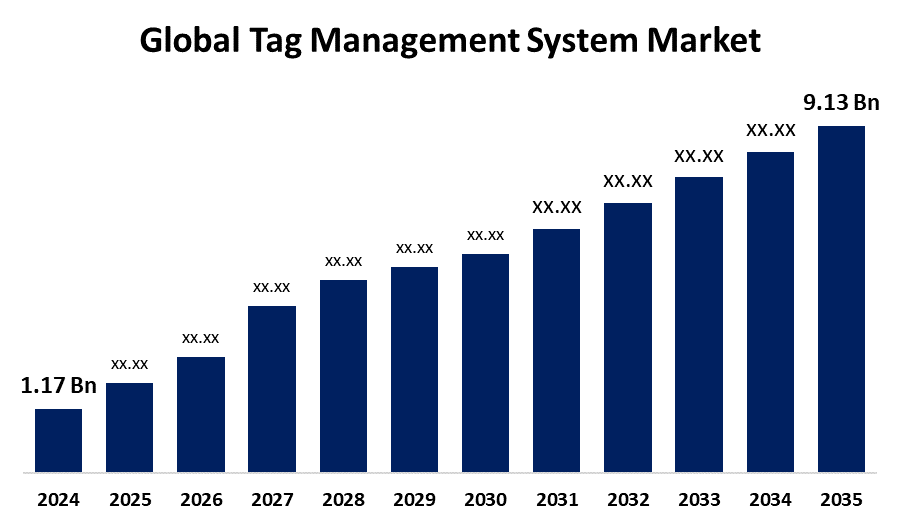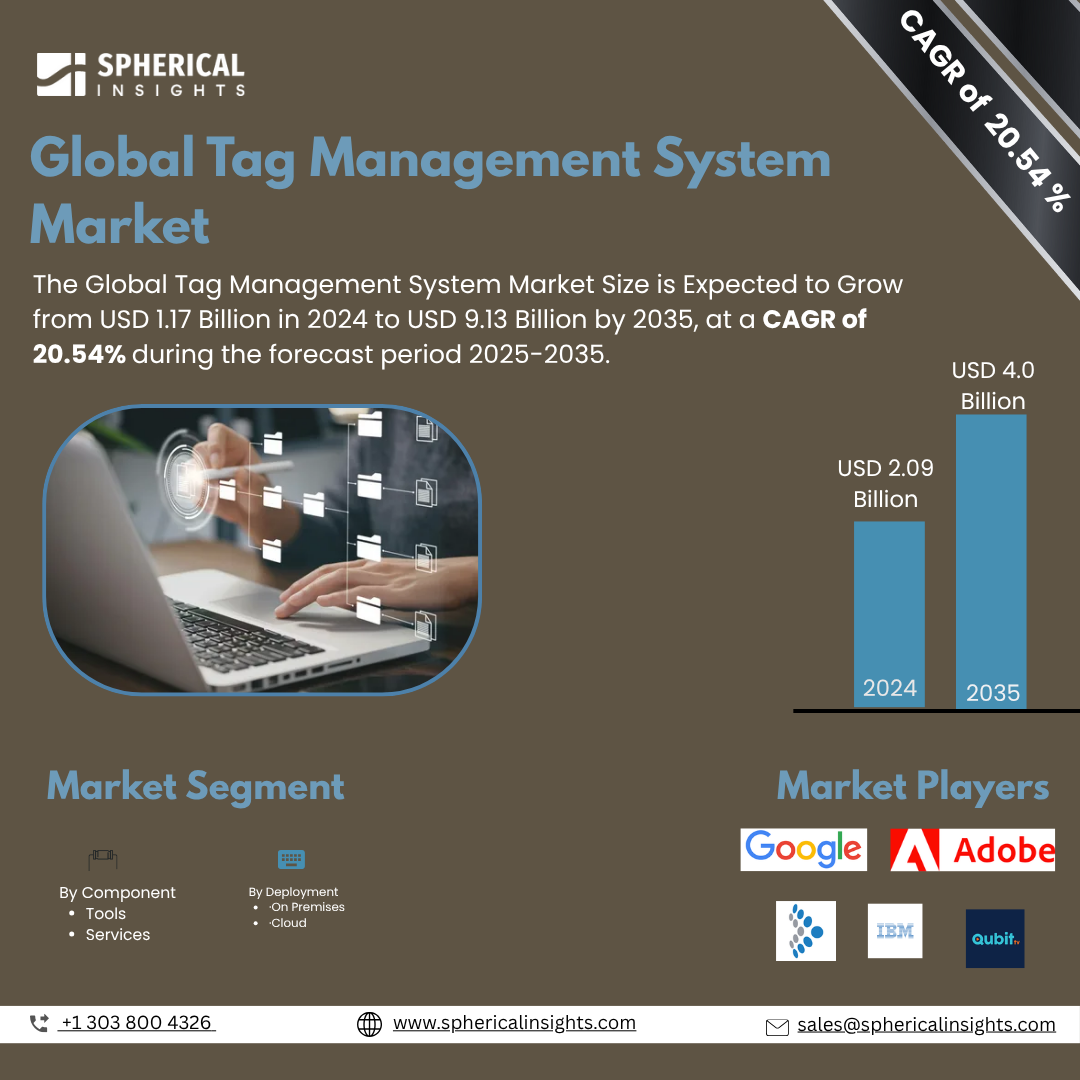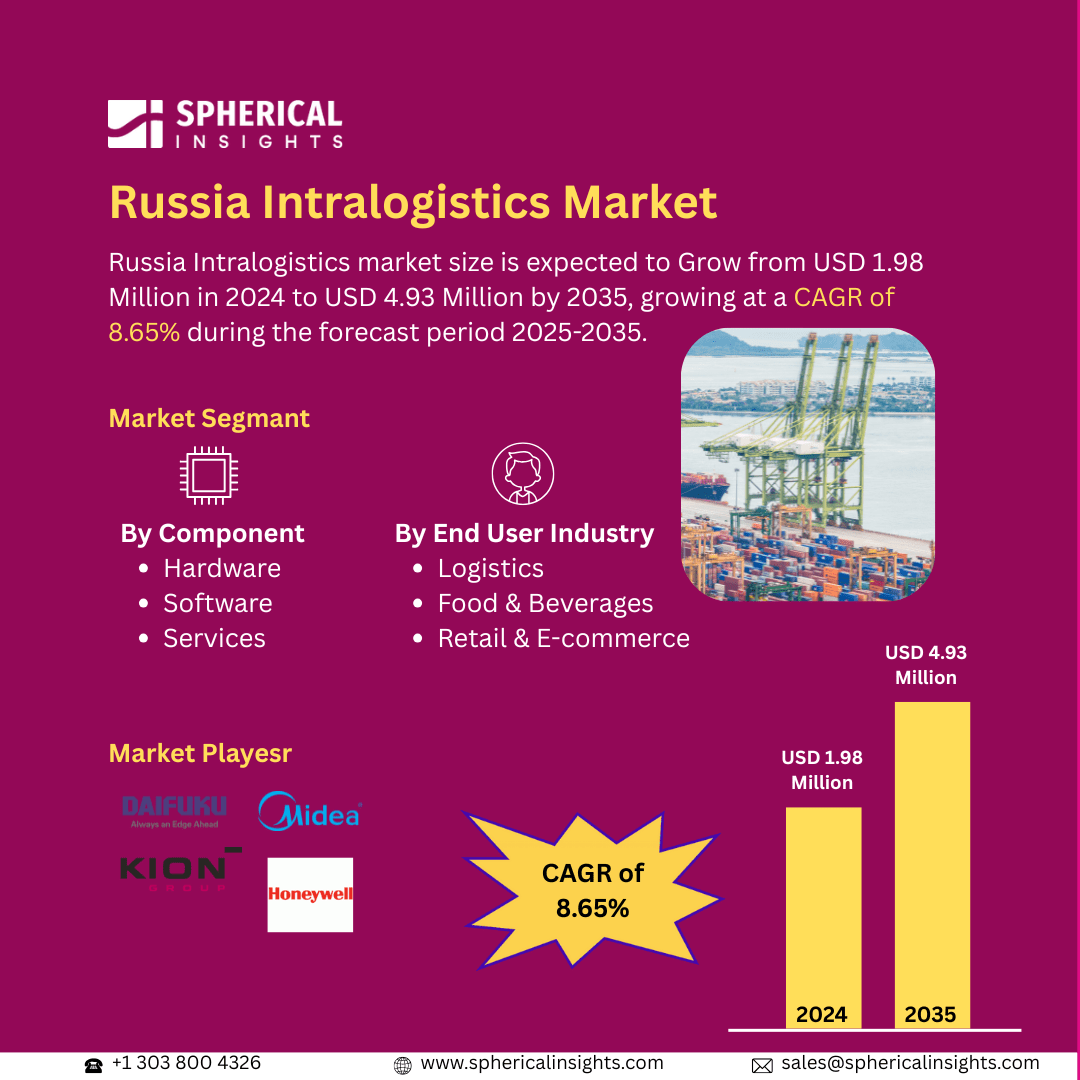Global Tag Management System Market Insights Forecasts to 2035
- The Global Tag Management System Market Size Was Estimated at USD 1.17 billion in 2024
- The Market Size is Expected to Grow at a CAGR of around 20.54% from 2025 to 2035
- The Worldwide Tag Management System Market Size is Expected to Reach USD 9.13 billion by 2035
- Asia Pacific is expected to grow the fastest during the forecast period.

Tag Management System Market
A tag management system is a tool that helps businesses easily manage small pieces of code called tags on their websites or apps. These tags collect information about visitors, like how they use the site or respond to ads. Instead of changing the website’s code every time a tag needs to be added or updated, a TMS lets marketers do this quickly from one place without needing a developer. This makes it faster to launch marketing campaigns and track results. More companies are using TMS because it helps them understand customer behavior better and improve their websites. Many TMS solutions are cloud-based, which means they are easy to use and can grow with the business. Overall, a tag management system simplifies managing website tags, making it easier to gather important data and improve online experiences.
Attractive Opportunities in the Tag Management System Market
- AI and machine learning enable smarter tag management with automated tag deployment, error detection, and improved data accuracy. This can significantly reduce manual effort and enhance marketing insights.
- Expanding TMS capabilities to track and analyze user interactions across IoT devices and various connected platforms opens new data collection avenues and use cases.
- As businesses grow globally, there is a rising need for TMS solutions tailored to different languages and regional markets, providing localized tag management and compliance.
- Increasing demand for instantaneous insights encourages TMS providers to develop real-time analytics features and form partnerships with CRM and marketing automation platforms, improving overall marketing effectiveness.
Global Tag Management System Market Dynamics
DRIVER: Increasing need for efficient data collection and management in digital marketing
The growth of the tag management system market is primarily driven by the increasing need for efficient data collection and management in digital marketing. As businesses focus more on personalized customer experiences, they require quick and accurate deployment of marketing and analytics tags, which TMS platforms enable. The rise of mobile internet usage and e-commerce has further amplified the demand for streamlined tag management to track user behavior across multiple channels. Additionally, growing concerns around website performance and load times encourage companies to adopt TMS solutions that help reduce tag-related delays. Another major factor boosting the market is the increasing emphasis on data privacy regulations like GDPR and CCPA, which require better control and compliance when handling user data. Cloud-based TMS offerings, providing scalability and easy integration, also contribute to market growth by lowering barriers to adoption for businesses of all sizes. Together, these factors are fueling the expanding adoption of tag management systems worldwide.
RESTRAINT: Complexity involved in implementing and integrating TMS solutions
One major issue is the complexity involved in implementing and integrating TMS solutions, especially for small and medium-sized enterprises (SMEs) with limited technical expertise. The initial setup and ongoing management may require skilled resources, which can increase costs and slow adoption. Additionally, some organizations remain hesitant to fully rely on TMS due to concerns about data security and privacy, fearing potential vulnerabilities when multiple third-party tags are managed through a single system. High costs associated with advanced TMS platforms can also be a barrier, particularly for smaller businesses with tight budgets. Furthermore, rapid technological changes and the constant evolution of digital marketing tools require frequent updates and adaptations, which can complicate long-term use. These factors combined may limit the pace at which some companies adopt tag management solutions despite their benefits.
OPPORTUNITY: Advances in artificial intelligence (AI) and machine learning
Advances in artificial intelligence (AI) and machine learning offer potential for smarter tag management, enabling automated tag deployment, error detection, and enhanced data accuracy. Integration of TMS with emerging technologies like Internet of Things (IoT) devices and connected platforms opens new avenues for tracking and analyzing user interactions across diverse environments. Additionally, as businesses expand their digital presence globally, there is growing demand for multilingual and region-specific tag management solutions tailored to different markets. The increasing focus on real-time data analytics also creates opportunities for TMS providers to offer more advanced, instantaneous insights. Moreover, partnerships between TMS vendors and marketing automation or customer relationship management (CRM) platforms can enhance overall marketing effectiveness. These evolving trends offer scope for innovation and expansion within the TMS market, attracting businesses looking for comprehensive and future-ready tag management capabilities.
CHALLENGES: Ensuring compatibility and seamless integration
One significant challenge is keeping up with the constantly evolving digital landscape, where new tracking technologies, browser updates, and privacy policies frequently emerge, requiring TMS providers to rapidly update their platforms. Ensuring compatibility and seamless integration with a wide variety of third-party tools and marketing technologies can be difficult, leading to potential data inconsistencies or tracking errors. Additionally, educating users on effectively utilizing TMS features remains a challenge, as improper use can result in inaccurate data collection or compliance issues. Another key challenge is managing increasing regulatory scrutiny on user data, which demands sophisticated solutions to balance comprehensive tracking with user privacy. Finally, as companies gather more data, the complexity of managing large volumes of tags and data flows grows, necessitating scalable and robust TMS architectures that not all vendors can offer.
Global Tag Management System Market Ecosystem Analysis
The global tag management system market ecosystem includes TMS vendors who develop management platforms, businesses across various industries that use these tools to optimize marketing and data collection, and digital marketing agencies that support implementation. Technology partners provide complementary solutions like analytics and cloud services to ensure seamless integration. Regulatory bodies also play a crucial role by enforcing data privacy and compliance standards, guiding how TMS solutions manage user data. Together, these players create a dynamic ecosystem that drives innovation and adoption in the TMS market.
Based on the component, the tools segment held the largest revenue share and is expected to grow at a significant CAGR over the forecast period

The tools segment held the largest revenue share and is expected to grow at a significant CAGR over the forecast period. This growth is driven by the increasing demand for efficient tag deployment and management solutions that simplify marketing and analytics processes. Tools enable businesses to quickly add, update, and manage tags without extensive coding, enhancing website performance and data accuracy. As organizations continue to prioritize data-driven strategies, the adoption of robust tag management tools is anticipated to rise steadily, fueling market expansion.
Based on the deployment, the cloud segment held the highest revenue share and is expected to grow at a remarkable CAGR over the forecast period

Cloud-based solutions offer scalability, ease of integration, and lower upfront costs, making them highly attractive to businesses of all sizes. These advantages enable faster implementation and flexible management of tags, supporting the growing need for agile digital marketing strategies. As more organizations shift to cloud infrastructure, the demand for cloud-deployed tag management systems is projected to increase significantly, driving market growth.
North America is anticipated to hold the largest market share of the tag management system market during the forecast period
North America is anticipated to hold the largest market share in the tag management system market during the forecast period. This dominance is attributed to the region’s advanced digital infrastructure, high adoption of digital marketing technologies, and stringent data privacy regulations that drive the need for effective tag management solutions. Additionally, the presence of major technology companies and early adopters of innovative marketing tools further supports the strong demand for TMS in North America.
Asia Pacific is expected to grow at the fastest CAGR in the tag management system market during the forecast period
Asia Pacific is expected to grow at the fastest CAGR in the tag management system market during the forecast period. This rapid growth is driven by increasing internet penetration, expanding e-commerce activities, and growing digital marketing investments across countries in the region. Additionally, rising adoption of cloud-based technologies and mobile platforms contributes to the demand for efficient tag management solutions, making Asia Pacific a key emerging market for TMS providers.
Recent Development
- In March 2023, Adobe launched Firefly, a generative AI tool integrated across Creative and Experience Cloud. Trained on Adobe Stock and public domain content, it ensures safe, commercial use. Firefly enhances tag-based workflows by enabling personalized content generation, embedding content credentials, and supporting ethical AI practices within marketing automation systems.
- In March 2022, Mouseflow released a specialized TMS integration with Google Tag Manager that enables ecommerce sites to capture shopping cart values within session recordings. By mapping the cart total via GTM into a Mouseflow custom variable, triggered on cart page views, it empowers funnel reports to analyze both conversions and lost revenue in recorded user sessions.
Key Market Players
KEY PLAYERS IN THE TAG MANAGEMENT SYSTEM MARKET INCLUDE
- Google
- Adobe
- Tealium
- Oracle
- IBM
- Ensighten
- Commanders Act
- Matomo
- Qubit
- AT Internet
- Others
Market Segment
This study forecasts revenue at global, regional, and country levels from 2020 to 2035. Spherical Insights has segmented the tag management system market based on the below-mentioned segments:
Global Tag Management System Market, By Component
Global Tag Management System Market, By Deployment
Global Tag Management System Market, By Regional Analysis
- North America
- Europe
- Germany
- UK
- France
- Italy
- Spain
- Russia
- Rest of Europe
- Asia Pacific
- China
- Japan
- India
- South Korea
- Australia
- Rest of Asia Pacific
- South America
- Brazil
- Argentina
- Rest of South America
- Middle East & Africa
- UAE
- Saudi Arabia
- Qatar
- South Africa
- Rest of the Middle East & Africa






